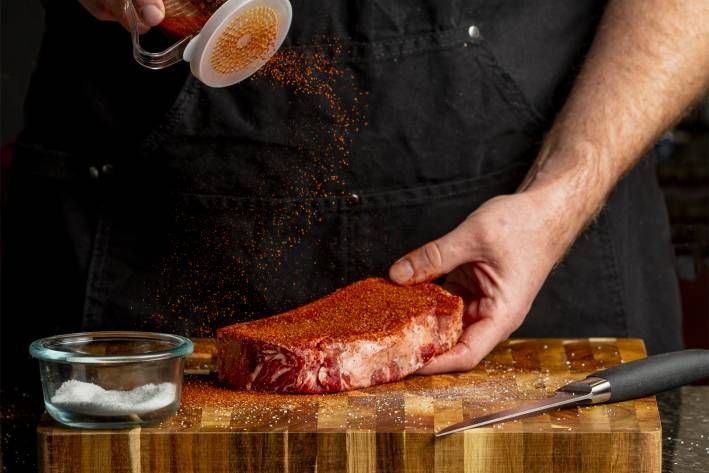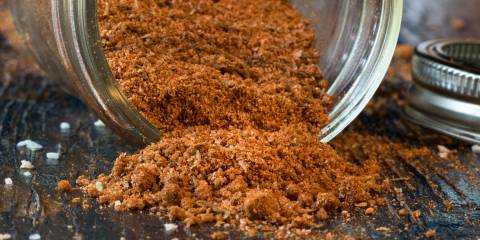There’s no doubt that grilling is a cooking method like no other. Though the taste is incomparable, barbecued food can still benefit from something more. This is where rubs and marinades come in.
Spice That Meat Up with a Rub!
The purpose of a rub is to flavor the food, yet allow its true taste to come through. Rubs also help form a savory and tasty crust.
Types of Rubs for Meat
There are two types of rubs: dry and wet.
-
What Are Dry Rubs?
Dry rubs contain only dry ingredients, such as ground spices, dried herbs, salt, and sometimes a sweetener like sugar. Dry rubs help reduce the overall fat of the finished dish, since they contain no oil.
-
What Are Wet Rubs?
Wet rubs, also known as spice pastes, start off as a dry rub but the addition of a liquid ingredient (oil, water, yogurt) makes them wet. The consistency of a wet rub is like that of a thick paste, which is then rubbed into the food.
Using Rubs on Meat
-
How do I Apply Rubs to Meat?
Apply rubs to all sides and edges of the item several hours before grilling, so marinating can take place. You can also sprinkle a dry rub over just before grilling, or rub it in with your fingertips.
-
How Much Rub Should I Use Per Pound?
Aim for 2 to 4 teaspoons of rub per pound of meat, fish, or poultry. Consider wearing a disposable pair of plastic or rubber gloves when working rub into meat or fish. This helps keep surface bacteria off your hands. Discard gloves after each use.
Marinades Are Liquid Gold!
Known as liquid seasonings, marinades are mixtures of different components (oils, acids, and aromatics). These include spices, herbs, garlic, onion, chili pepper, olive oil, soy sauce, citrus juice, vinegar, and yogurt.
Because marinades are wet, they infuse food with flavor through soaking. Acids in the marinade also help tenderize meat by breaking down meat fibers. Oils in the marinade keep the exterior of the food from drying out, and aromatics such as herbs and spices provide flavor.
Always marinate food in the refrigerator in a tightly covered bowl or dish. Since most recipes are for one use only, discard the marinade after using what you need.
Marinating Times & Strengths
Marinating time depends on the strength of the marinade, what the food is, and its size and cut. As a general rule, large pieces of meat (leg of turkey, brisket, pork shoulder) take about 24 hours. Marinate whole chickens, large whole fish, and beef and pork tenderloins for 6 to 12 hours. Medium-size pieces of protein (steaks, pork chops, chicken halves and quarters) reach optimal flavor in 4 to 8 hours. Small cuts (boneless chicken breast, shrimp, fish fillets) need only 15 minutes to 2 hours of marinating time.
Another consideration is the strength of the marinade. A lightly flavored one with fresh herbs takes longer to impart flavor than one with fiery chilies and strong spices. Speed up marinating time by making deep cuts in the sides of a whole fish or in pieces of chicken.
Immersion and Coverage
It’s not necessary to fully submerge an item in marinade. Just turn it several times during the marinating process.
Basting
If you wish to baste food with marinade while grilling, set aside about a quarter of the marinade before marinating the item. Use the reserved portion for basting toward the end of the grilling time.
Safe Container Materials
Just be sure to marinate items in a nonreactive container (glass, stainless steel, ceramic, or porcelain). Avoid cast iron and aluminum vessels as they can react with a marinade’s acids.
Marinade Flavors
When making a marinade, consider certain flavor associations. For example, lemon juice pairs well with fish. Let your imagination guide you.






